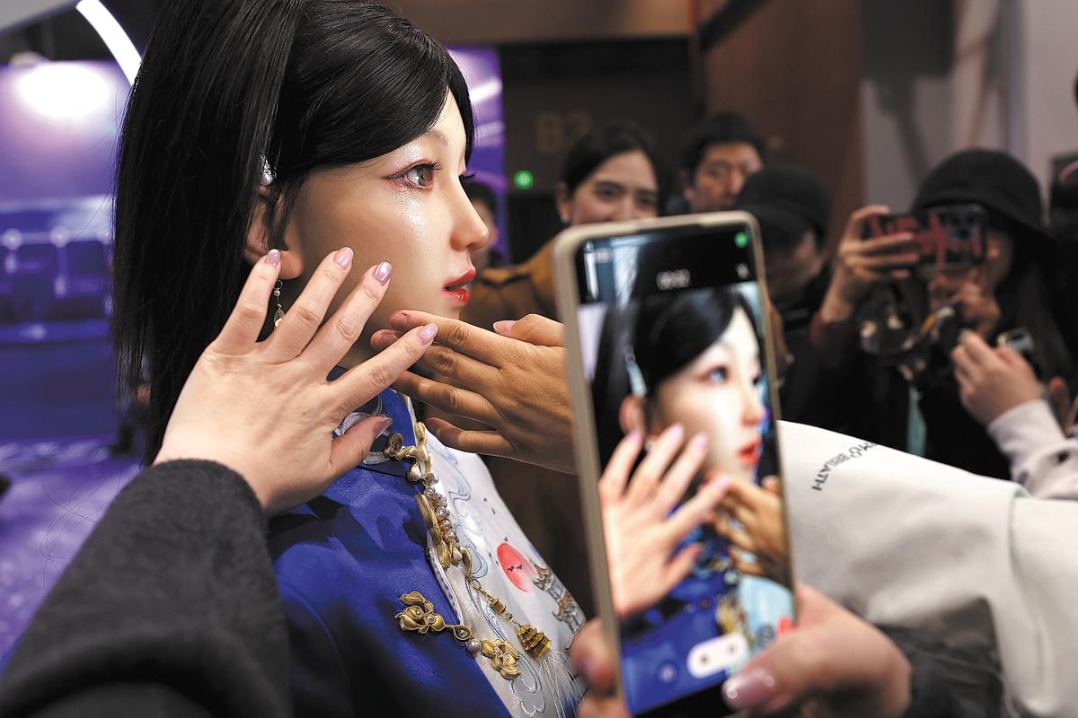AI to perk up consumer electronics sector
Chinese firms display innovative products at 2025 CES in Las Vegas


Industry insiders said this robust participation underscores the growing innovation capabilities of Chinese companies in cutting-edge technologies and emerging fields, and competitiveness on the global stage, as well as their willingness to expand international cooperation.
AI-powered goggles gained strong traction during the show. RayNeo, a Chinese augmented reality technology company, unveiled its new lineup of AI-powered photography glasses with enhanced human-computer interaction functionality.
The company has inked a strategic partnership with Alibaba Cloud, the cloud computing unit of Chinese tech heavyweight Alibaba Group Holding Ltd, to integrate the latter's ChatGPT-like large language model Tongyi Qianwen into its AI glasses. The move marks the first in-depth collaboration between an LLM developer and AI glasses manufacturer in China.
Alibaba Cloud intends to provide exclusive technological support for RayNeo's products, and develop customized AI models for smart glasses that better understand the needs of users and improve the interactive experience, so as to enable a deeper integration between AI and hardware.
Chinese esports equipment company Thunderobot debuted its AI-enabled glasses featuring micro organic light-emitting diode displays and cameras, and having access to AI models to offer real-time information and immersive AR experiences.
Hangzhou-based AR glasses maker Rokid showcased its latest smart glasses with AR and AI capabilities including real-time language translation, instant object recognition, AI-driven meeting transcription, and presentation teleprompters.
Industry insiders said by integrating advanced AI functions, smart glasses can provide more intelligent and personalized services, such as intelligent navigation, voice assistance and health monitoring to meet the diverse needs of consumers.
Pan Xuefei, research director at market consultancy IDC China, said global shipments of AI glasses are expected to reach 12.8 million units in 2025, an increase of 26 percent year-on-year, while shipments in China will surge 107 percent year-on-year to 2.8 million units.
Pan said AI models will bring about abundant application scenarios for smart glasses, while these glasses' multimodal interaction functions covering text, images, audio and video would further improve.
"Along with technological advancements in key components such as AR and VR chips, camera modules and displays, the costs of AI glasses will significantly decline, thus promoting the popularization of such products among consumers," she said.
Data from technology industry research firm Runto showed that smart glasses with AI functions accounted for less than 20 percent of the total in 2024. However, the penetration rate of AI functions in the smart glasses market will exceed 60 percent this year, fueled by iterations in display technology, enhanced performance of chips, and algorithm capabilities.
Chen Jun, deputy general manager and chief analyst at Sigmaintell Consulting, a Beijing-based market research firm, estimates that domestic shipments of AI glasses reached 2.2 million units in 2024, and will witness a 60 percent year-on-year growth this year.
Chen said AI glasses are expected to see rapid growth in sales because of their simple functions and lower prices, and such glasses will satisfy basic demands from users, such as taking pictures, making phone calls and listening to music.
The deep integration of technology like AI has made robots smarter, more flexible and more autonomous. A series of drones and electric vehicle charging stations equipped with soft robotics grabbed the attention of visitors at the CES. These robots came from Chinese robotics company Wisson Robotics.
The company said its robots have been applied in various industries, including high-altitude cleaning, intelligent charging, energy maintenance, emergency rescue and environmental protection.
Cheng Hui, marketing director of Wisson, said conventional robots are usually made of metal and equipped with motor joints and a large number of sensors, but they have some shortcomings in terms of weight, adaptability and safety.
"In contrast, soft robots, which adopt soft materials and structure, are more suitable for complex and ever-changing environments in daily life, and can perform diverse tasks in different industries and scenarios," Cheng said.
Such robots have gained an upper hand in safety and flexibility, and are expected to take an about 50 percent share in the robotics market in the future, he added.
For instance, aerial cleaning robots with flexible joints are able to adjust angles in the air, and clean exterior walls of buildings and other high-altitude structures, significantly improving the efficiency of traditional manual operations while ensuring the safety of operators.
Cheng said the company's products have been sold in more than 100 countries and regions including the United States, Europe, the Middle East, Australia and Latin America. It will step up efforts to promote the application of soft robots in more fields and scenarios, he added.
Wisson hopes to enhance brand awareness, expand in international markets and let more global consumers learn about its innovative robotics technologies by participating at the CES, Cheng said.
Robotics technology company Segway-Ninebot showcased more than 20 products, including smart robotic mowers, electric scooters and e-bikes during the show. The company said it hopes to gain insights from global users and expand its presence in the global market via the CES.
Chinese home cleaning appliances maker Dreame Technology presented its robotic vacuum cleaners and window-cleaning robots. The company's revenue from overseas surged more than 120 percent year-on-year in 2023, with global sales of its robotic vacuum cleaners surpassing 2.4 million units, skyrocketing 300 percent from a year earlier. Over 50 percent of its revenue came from overseas last year, it said.
Currently, Dreame Technology's products are available in more than 100 countries and regions, including Europe, North America, Southeast Asia, East Asia, the Middle East, Africa and South America.
Yu Hao, founder and CEO of Dreame Technology, said the company will increase investments in R&D, establish global industrial chain systems and retail networks, and enhance operating capacity in international markets.
"In 2024, global shipments of robots stood at 47 million units, and this will likely reach nearly 60 million units this year. Robots are mainly divided into service robots, industrial robots, and robots used for special purposes such as emergency rescue," said Chen of Sigmaintell Consulting.
According to Chen, service robots currently account for 80 percent of the total market share, among which nearly 70 percent are used in cleaning tasks including vacuum cleaners and window-cleaning robots.
The robotic industry will see speedy growth driven by improved AI integration capacities and rising costs of manual labor, he said.
"Chinese companies are diversifying their overseas strategies, with product portfolios expanding from traditional PCs, smartphones and tablets to emerging AI-powered terminal devices, such as smart glasses, robot vacuum cleaners and smart home equipment, which will become a new engine driving the growth of the consumer electronics industry," said Wang Jiping, vice-president of market research company IDC China.
Wang said domestic enterprises are constantly upgrading their products and technologies to satisfy the increasingly diversified needs of global consumers and gain a bigger slice of the midrange to high-end overseas market.
China has been taking the lead in the international display market. Chinese display panel manufacturer BOE Technology Group Co Ltd launched an array of new technologies and products, including a 31.6-inch slidable OLED display, a vehicle-mounted screen with foldable and curved functions, and an AI-powered smart cockpit.
Liu Zhiqiang, senior vice-president and chief technology officer of BOE, said the application of AI technology in display products will make the devices more intelligent and suitable for more usage scenarios, adding that the company will continue to invest in AI.
Chinese consumer electronics maker TCL showcased a diverse range of innovative gadgets, such as QD-Mini LED TVs, mobile phones, tablets, smart projectors and augmented reality glasses, as well as AI-enabled companion robots.
"The true value of AI lies in its application," said Li Dongsheng, founder and chairman of TCL Technology Group, emphasizing that the company will focus on building core AI capacities, achieving technological breakthroughs and expanding its global presence.
In the process of globalization, TCL has ratcheted up resources to strengthen localized R&D, production, marketing, and operations in overseas markets. It has established a research and development center in Silicon Valley, expanded the production capacities of its manufacturing base in Mexico, and become an official partner of the National Football League in the US.
Li said the company's US business increased 20 percent year-on-year in 2024, while estimating that its sales revenue in North America will see 30 percent year-on-year growth in 2025.
Sun Li, chief technology officer of TCL Industries Holdings Co Ltd, said generative AI and large language models are playing an integral role in creating seamless and intuitive smart home environments.
"Chinese companies are at the forefront of global technological innovation, and have made remarkable progress in tech frontiers, such as AI, AR and robotics," said Hong Yong, an associate researcher at the Chinese Academy of International Trade and Economic Cooperation.
This will help boost their competitiveness on the global stage and drive the transformation from "Made in China" to "Created in China", Hong said.
























